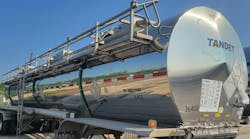Economic Affairs Minister Maria van der Hoeven gave the official green light for the construction of the first LNG (liquefied natural gas) import terminal in the Netherlands, on Maasvlakte in Rotterdam.
The terminal will have an initial throughput capacity of 9 billion cubic meters (bcm) per annum and will consist of three storage tanks and one jetty. Annual throughput capacity can be increased to 16 bcm a year in the near future. Each tank will have a capacity of 180,000 cubic meters.
As an independent LNG terminal, Gate terminal will be an important factor for the European receipt of gas from other countries. Imports are necessary as Europe's own production is declining yet demand for natural gas is rising. The terminal will both increase the security of supplies and enable new players to enter the European gas market.
A consortium consisting of Techint, Sener, Entrepose, and Vinci will build the terminal. The total project costs will be about 800 million Euros. The terminal is expected to be fully operational in the second half of 2011. The construction of the Gate terminal will also strengthen Rotterdam's position as an energy port. The port authorities are investing 60 million Euros in the basic infrastructure.
N.V. Nederlandse Gasunie (Gasunie) and Koninklijke Vopak N.V. (Vopak) therefore decided in 2005 to develop Gate terminal (Gas Access to Europe), an LNG import terminal. The terminal's functions are: receipt, a buffer between receipt and continuous supply of natural gas, regasification, and supply. Imported LNG will be regasified and stored under pressure at the terminal before it is supplied at a constant rate to the Dutch transmission network. There will be no change in the composition of the product. The main functions of the LNG import terminal as a whole will therefore be storage and handling; no waste will be produced.








